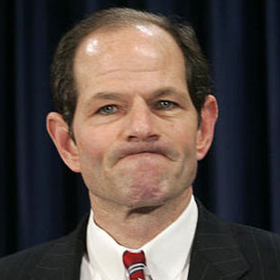Client 9

2.5/5
Anyone walking in to the experience of Client 9: The Rise and Fall of Eliot Spitzer with at least a basic understanding of the political implications of the titular “fall” will have, in all likelihood, already drawn one of the following two conclusions as touching it: that Spitzer was a good man who devoted his life to fighting greed and corruption, but was undone by his own frailty and forced to resign as governor of New York, not out of incompetence or criminal culpability, but for sullying an office that demands of its holders extreme moral scrupulousness; or, that he was a bad man and a hypocrite because he had once prosecuted (white collar) criminals but was himself, though never charged, in a sense "guilty" of other crimes which, albeit rarely if ever prosecuted, are just as bad as those which endanger the stability of our nation's economy and affect millions of lives. The problem with the latter position is that it's completely untenable and a two hour documentary devoted to proving it would have to be so facile, so utterly dependent upon gossip, conjecture and muck-raking and so deeply entrenched in after-school-special morality that it would, through sheer incompetence, inadvertently refute its own argument.
The journalistic "authorities" that would appear in such a documentary would include people like New York Post state editor Fred Dicker. Political figures like Joe Bruno and power brokers like Roger Stone—who have been, for the past two years, virtually screaming their culpability in Spitzer's removal—would be granted twenty minutes of screen time each to emphatically state their cases against the man—but mostly just insult him on a personal level and tell insane lies. Such a film might even feature a sworn enemy of Spitzer from his days as New York State Attorney General like Kenneth Langone, discussing the time an associate of his saw the letters “E-V-I-L” appear across Spitzer's forehead in a meeting ("hand to god, true story!") and perhaps even a local performance artist who wrote a one woman show on the scandal discussing her own personal feelings on the matter.
While Client 9 features all of this nonsense and more, it is, strangely, neither an indictment nor a beatification of Spitzer: it is a (failed) attempt at an even-sided handling of the "facts" surrounding his calculated destruction. Although interview footage with (a highly guarded and justifiably wary) Spitzer prominently features in the film, and Gibney, in both his narration and general thesis, makes no bones about the fact that Spitzer was set up and removed from his office by the Albany political machine for political—not moral or legal—reasons, he allows his story to be told almost exclusively by the well-heeled professional liars, slippery con-men and well-paid-off prostitutes and madams directly involved in Spitzer's downfall. The overall effect is to essentially outsource the storytelling to other professional storytellers, which is alternately banal and sleazy.
Hearing Cecil Suwal, the CEO of the upscale bordello which Spitzer frequented, speak for more than five minutes is one of the film’s most unpleasant features and her shrill, incessant and inexplicable laughter seems to encapsulate the film's main deficiencies in that it is a bit of purposeless fluff that merely fills up time as she offers no insight into the affair apart from suggesting that Spitzer should not have patronized her business if he was "so worried about getting caught." By the same token, letting people like Bruno, Langone and Stone witter on and on endlessly seems to have a legitimizing effect: the more we hear them speak, and the less we see them contradicted by Gibney, the more "true" their moral castigation and bizarre accusations of conspiracy theories and sexual deviancy seem to ring.
It may be that Gibney's intentions were to let these characters reveal their own iniquities by merely giving them a platform upon which to voice their opinions, but this would have been almost impossible given that most of them are professional spin artists who excel at skewing facts and warping the truth, and given the sheer size of the canvas each of them is allotted, they do make convincing albeit specious arguments: Joe Bruno actually comes across as a victim, a sweet, hoary-haired, leather-faced grandfather figure of Albany politics who was ever so cruelly targeted by angry young Spitzer! Only Gibney neglects to mention that Joe Bruno is a political gangster who accepted $3.2 million dollars in bribes over a period of thirteen years on the state senate. So it's quite obvious that Gibney's intentions were to give the poor beaten down unloved winners and power monopolists their "fair say" and mostly disregard the underdog—aren't we sick of rooting for underdogs anyway—which beggars the following question: since we're already aware of the argument against Spitzer, and since his detractors have already succeeded in having him removed from office, what is the point of hearing even more of their invective other than to rub salt in his wounds?
RELATED ARTICLES
Get the most-revealing celebrity conversations with the uInterview podcast!





Leave a comment